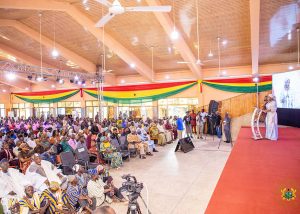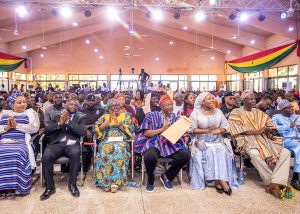The government has outlined some of its achievements since taking over the administration of the nation in 2017.
Ranging from education, health, agriculture and roads among others, the government accounted to the people at a regional town hall meeting and exhibition held in Tamale on Tuesday, October 8, 2024.
The engagement saw presentations from the Ministry of Finance, the Northern Regional Minister and concluded with an open forum session where officials, including the Minister for Information, Fatimatu Abubakar, took turns to answer probing questions from the public that attended.
ECONOMY
A Deputy Minister for Finance, Dr. Alex Ampaabeng, who made a presentation on the state of the Ghanaian economy, announced that the economy was back to the pre-COVID-19 era.
According to him, the economy, which suffered hugely due to the pandemic, has recovered and witnessed three successive periods of positive economic growth.
“The economy has recovered. Three continuous successive positive economic growths are indeed an indication that we are back,” he said.

The Ghana Statistical Service reported that the economy in the first quarter of 2024 grew at 4.7 percent and 6.9 percent in the second quarter.
In his presentation, Dr. Ampaabeng referenced the inflation rates from 2016 when there was no COVID to the first term of the government and concluded on the current rate to express optimism that the year may end with an inflation rate of 15%.
He recalled that the NPP came into power in 2017, when the 2016 inflation was 15.4%. By the end of 2017, inflation had moved from 15.4 to 11.8 percent. In 2018, it reduced to 9.4, and then in 2019, it reduced to 7.9.
“So from 2018 to 2019, we recorded a full two years of single-digit inflation. That was a record,” he added.
Though the rate moved to about 54% last year, it currently stands at 21.5%, but the Deputy Minister for Finance said, “And I have no doubt that by December 2024 we will meet our inflationary target of 15%.”
POLICY IMPACT
During the open forum, some questions centered on a perceived neglect of Persons With Disabilities (PWDs) by the government.
The Minister for Information, Fatimatu Abubukar, responded to that question, including another about the impact of government policies on women, children and vulnerable persons.
The minister, in her response to the gender, children and social protection question, cited official statistics from the ministry of education to make a point.
According to her, the introduction of the Free Senior High School policy, for instance, had increased female enrolment.
“Before the year 2017 and before the introduction of free senior high school, the national data on the number of young people who are in Senior High Schools show that for every 100 boys, there were 64 girls in school.
Since the introduction of free SHS, the national data shows that for every 100 boys, there are 106 girls in senior high schools,” she noted.

She continued that, “What this means is that, ask yourself, if there was money to take all these girls to school, why were they left behind? In the absence of Free Senior High School, calculate the remaining 36% of girls who either were unable to go to senior high school. What were they doing?
“They were the same girls that people were taking to their homes as house helps and assistants. It means the issue of money was an actual barrier to a lot of families sending their girls to school and for them to reach the level that, Alhamdulillah, all of us have been able to reach. So, there is a real impact on the ground, and people are feeling it.”
PWDS NEGLECT
On the issue of PWDs neglect, the Minister for Information indicated that the government had increased the statutory allocation to the PWDs from the District Assemblies Common Fund.
“It used to be two percent. When President Akufo-Addo and Dr. Mahamudu Bawumia came into office, they said the allocation to persons living with disabilities was small, so they actually increased the allocation by 50 percent, meaning today the component of the district assembly’s common fund that goes to persons living with disabilities has moved up from two percent to three percent.
Concluding her remarks, the Minister for Information said she was returning to Accra with a lot of ideas and information that the people of Tamale had shared to inform the government.










